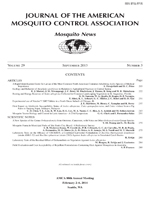Aedes albopictus, the Asian tiger mosquito, was 1st detected in Spain in 2004 and since then has spread along the Mediterranean coast. New adulticiding strategies are being tested to enhance control of the species. The residual effect of applications of 2 formulations containing deltamethrin over vegetation was evaluated in bioassay tests for 34 days. Hedera helix plants were treated with K-othrine SC25® (deltamethrin 2.56% SC) and Aqua K-othrine® (deltamethrin 2.03% EW). Bioassays consisted of exposing batches of Ae. albopictus females to treated plants. Significant mortality (>80%) for up to 12 days was obtained with Aqua K-othrine, and for up to 5 days using K-othrine SC25. Results show that the type of formulation has an impact on the residual effect of deltamethrin against Ae.albopictus. This validates the strategy of applying pyrethroid insecticides to vegetal barriers for the control of this species, as carried out in several countries.
How to translate text using browser tools
1 September 2013
Laboratory Tests of the Residual Effect of Deltamethrin on Vegetation Against Aedes albopictus
Mikel Bengoa,
Roger Eritja,
Javier Lucientes
ACCESS THE FULL ARTICLE
It is not available for individual sale.
This article is only available to subscribers.
It is not available for individual sale.
It is not available for individual sale.
Aedes albopictus
barrier
persistence
pyrethroids
vector control





